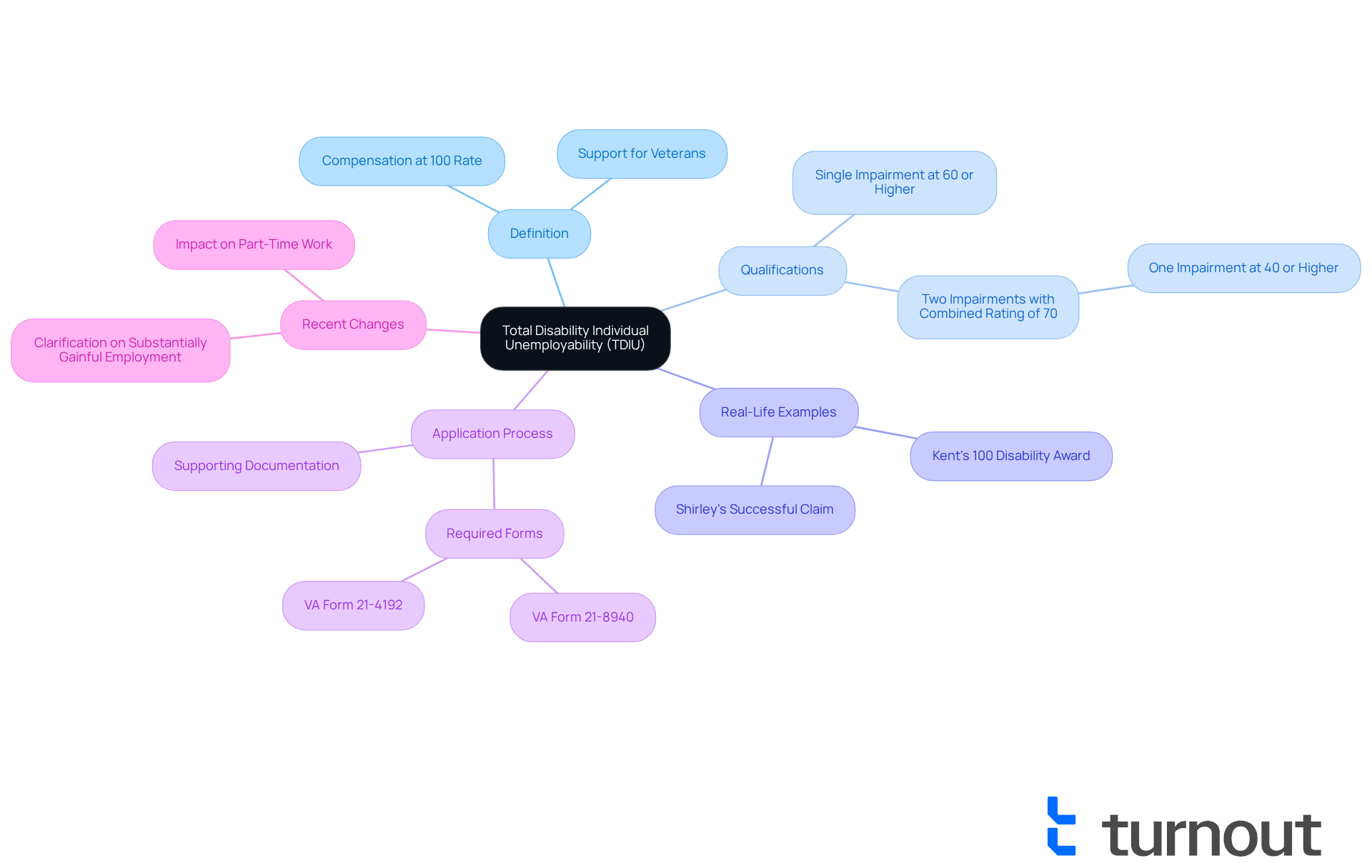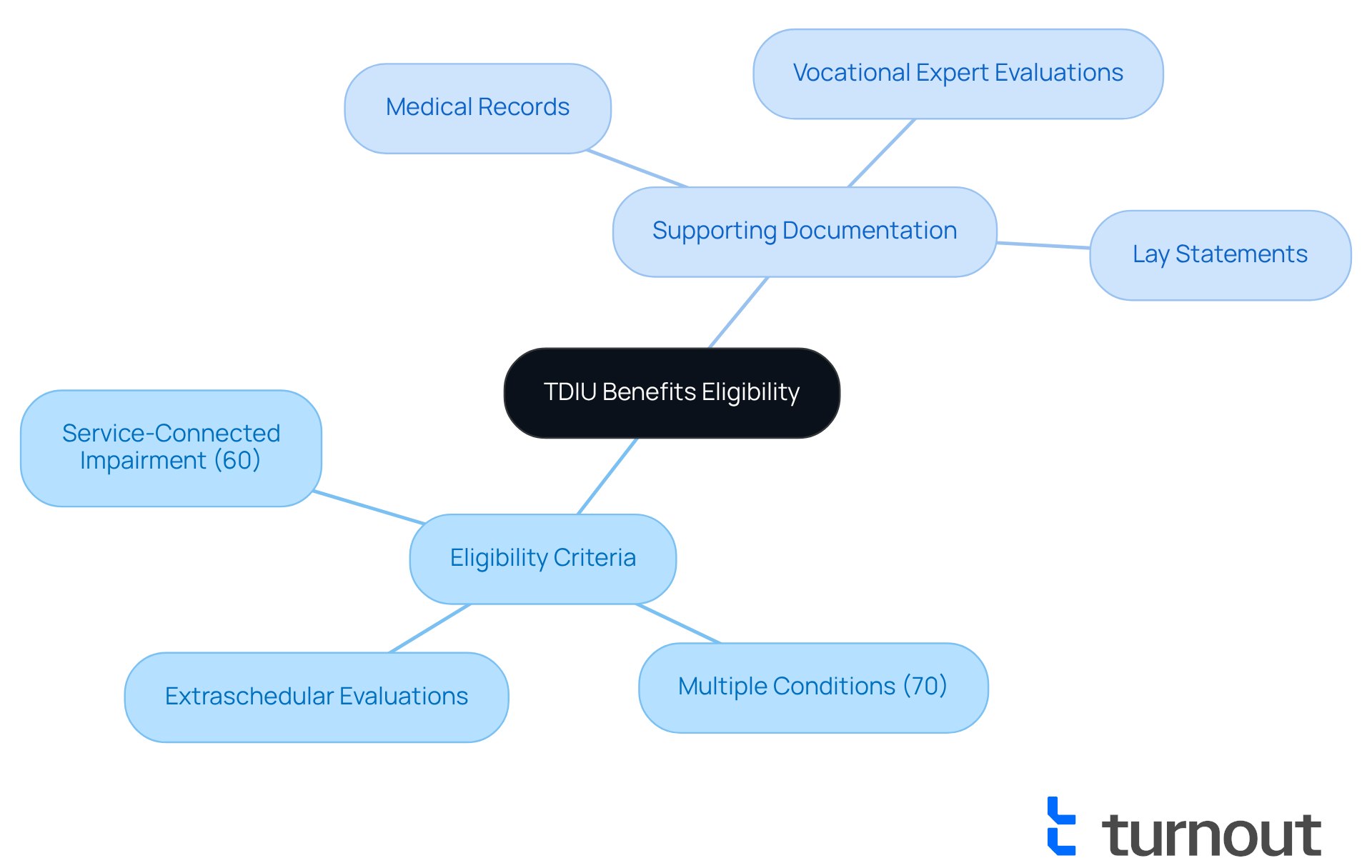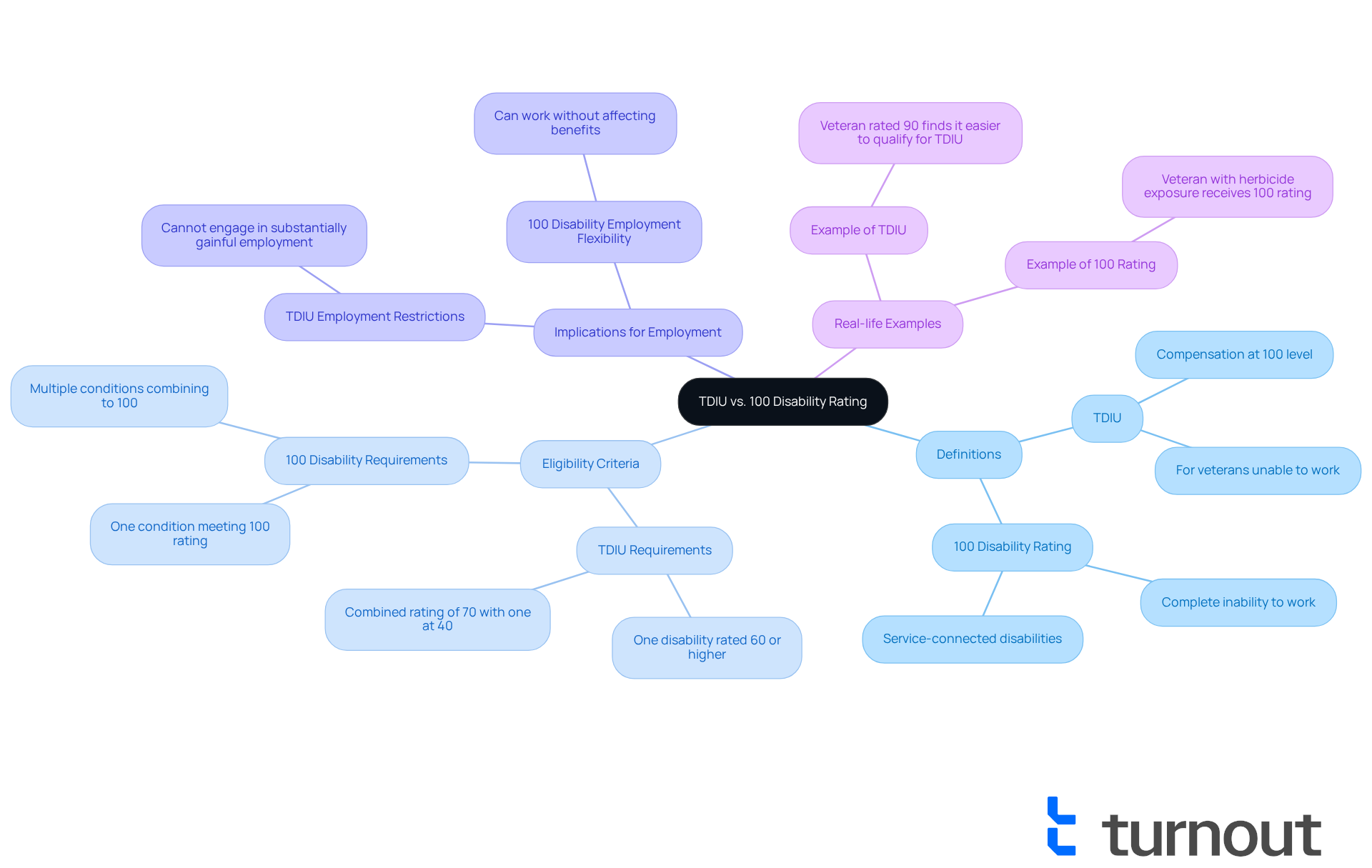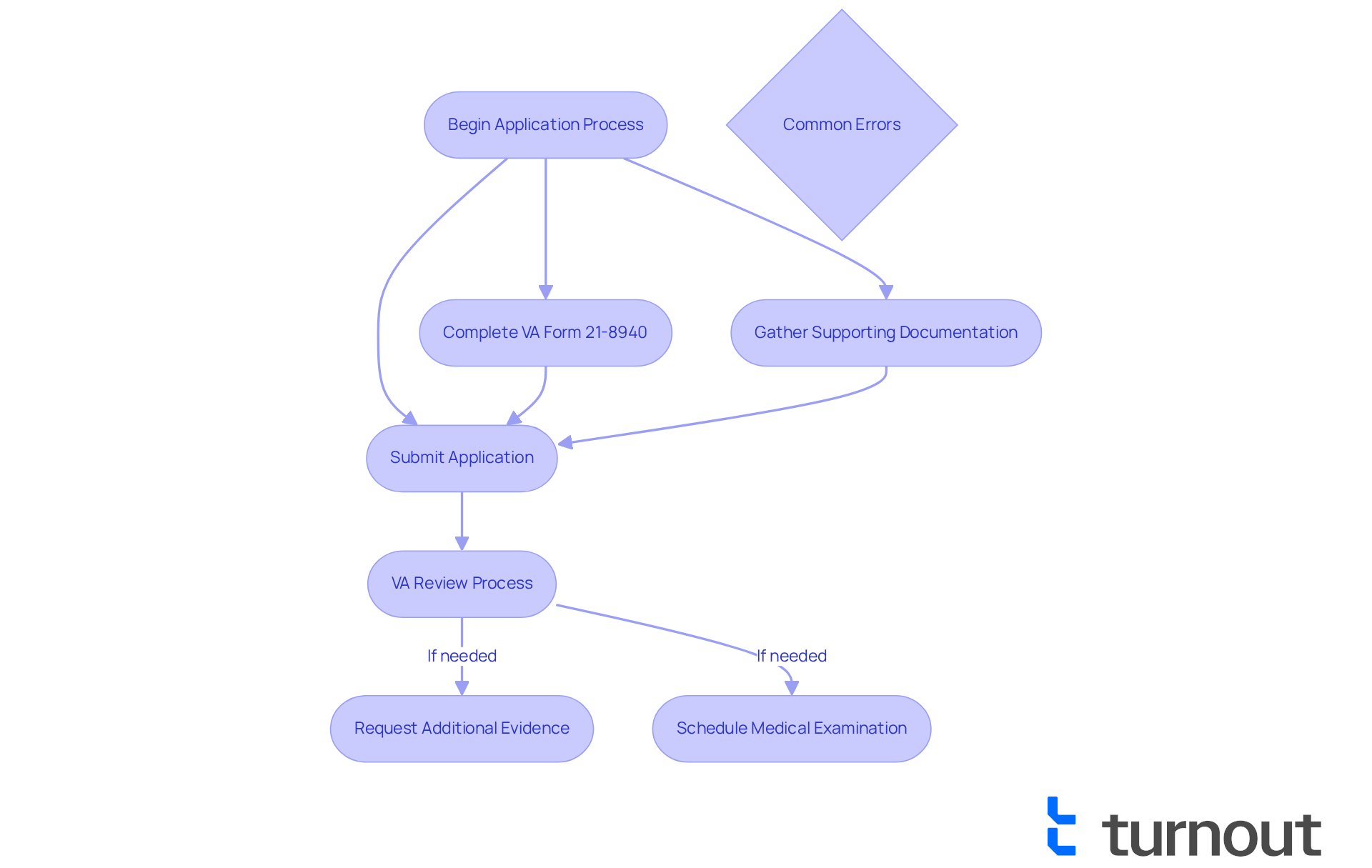Overview
Navigating the complexities of veteran benefits can be overwhelming, especially when it comes to understanding Total Disability Individual Unemployability (TDIU). This program allows veterans to receive compensation at the 100% disability rate if their service-connected disabilities hinder them from maintaining substantial employment, even if they do not meet the standard impairment criteria.
We understand that eligibility requirements and application procedures can feel daunting. It’s important to recognize the differences between TDIU and a 100% disability rating. By emphasizing thorough documentation and grasping the nuances of the VA's evaluation process, you can effectively navigate claims for benefits.
Remember, you are not alone in this journey. We're here to help you every step of the way. Take the time to gather your information and understand your options, and don't hesitate to reach out for support. You deserve the benefits you’ve earned.
Introduction
Understanding the intricacies of Total Disability Individual Unemployability (TDIU) is essential for veterans navigating their benefits. We recognize that this unique compensation program can serve as a lifeline for those whose service-connected disabilities hinder them from maintaining gainful employment, even if their impairment ratings do not meet the 100% threshold. Yet, the journey to secure these benefits can often feel overwhelming and complex.
What are the specific eligibility requirements, and how do they differ from a standard 100% disability rating? It's common to feel uncertain during this process. As you seek clarity in your claims, the answers to these important questions can unlock the support you truly deserve.
Define TDIU: Total Disability Individual Unemployability
The , which stands for Total Disability , is a vital support provided by the Department of Veterans Affairs (VA), allowing individuals to receive compensation at the 100% rate, even if their do not meet that level. This benefit is specifically designed for former military personnel whose impairments prevent them from obtaining and maintaining significantly rewarding employment. We understand that some veterans may not meet the standard impairment assessment criteria, yet they still struggle to work due to their service-related conditions.
To qualify for total disability based on individual unemployability, individuals must have:
- At least one service-connected impairment rated at 60% or higher, or
- Two or more impairments with a combined rating of 70% or greater, with one impairment rated at least 40%.
For instance, consider an experienced service member with a service-connected heart condition rated at 60%. This individual was deemed unemployable due to declining health, resulting in an increase in their compensation to match that of a 100% disabled individual.
have clarified what constitutes 'substantially gainful employment.' This is a significant adjustment, as it allows to work part-time without jeopardizing their disability benefits, provided their income does not exceed the VA's established limit. Importantly, the VA recognizes that some veterans may be able to work in a 'protected environment,' such as a family business or sheltered workshop, without it affecting their eligibility for total disability based on individual unemployability, which is related to the TDIU meaning.
Real-life examples illustrate the impact of TDIU meaning on the lives of those who have served. For example, Shirley successfully asserted individual unemployability, which was approved effective August 30, 2022. Her story shows that former service members can obtain benefits for unemployability. Additionally, Kent's experience of receiving a 100% disability award after 45 years of denials underscores the importance of effective support in navigating the VA disability process.
To request total disability based on individual unemployability, individuals who have served must submit VA Form 21-8940 and VA Form 21-4192, which are essential for processing their claims. As the landscape of VA assistance evolves, we encourage former service members to stay informed about potential changes that may affect their claims. Understanding these updates is crucial for those relying on disability support or considering an application for assistance, empowering them to navigate the complexities of the VA system with confidence. Remember, you are not alone in this journey; . We provide access to trained advocates who can simplify the navigation of government assistance and financial support, without the need for legal representation.

Eligibility Requirements for TDIU Benefits
Qualifying for benefits based on Individual Unemployability can feel overwhelming when considering the . We understand that navigating this process requires clarity and support. To be eligible, individuals must meet specific criteria. Primarily, you need a or multiple conditions with a combined rating of 70% or higher, ensuring that at least one condition is rated at 40% or more.
It's important to demonstrate how your service-related impairments significantly obstruct your ability to obtain and sustain . This means your impairments must greatly hinder your capacity to earn a living wage in a standard job setting. Thorough documentation outlining the challenges and their effects on your employment is essential during the . This documentation may include:
- Medical records
- Vocational expert evaluations
- Lay statements from family or coworkers
Recent statistics reveal that many former service members, even if they do not meet standard percentage criteria, can still qualify for through extraschedular evaluations. This highlights the importance of understanding the TDIU meaning and the nuances of eligibility standards. Moreover, expert opinions emphasize that the VA's evaluation process focuses solely on the impact of service-connected disabilities on employment, rather than age or prior work experience. This ensures that all individuals are assessed fairly based on their unique circumstances.
It's also crucial to be aware that surpassing the poverty line can have implications for your disability benefits. Remember, you are not alone in this journey. Seeking help from can provide significant support in managing the application process. We're here to help you every step of the way.

TDIU vs. 100% Disability Rating: Key Differences
While both and a 100% rating offer the same level of compensation, they differ in their criteria and implications. A is granted when an individual's are deemed to completely hinder their ability to work, according to the VA's rating schedule. In contrast, total disability based on individual unemployability is specifically for those who may not meet the 100% rating criteria but are still unable to work due to their .
It's important to note that individuals receiving total disability based on individual unemployability support cannot engage in substantially gainful employment. On the other hand, those with a 100% evaluation can work without it affecting their assistance. This distinction is crucial for who are considering their employment options while receiving benefits.
To be eligible for total disability based on individual unemployability, individuals must have at least one service-related impairment rated 60% or higher, or several conditions with a combined rating of 70% or more. Real-life examples illustrate these distinctions. For instance, an individual rated at 90% for various disabilities may find it easier to qualify for than to achieve a 100% rating, especially if their conditions do not fully meet the criteria for total disability.
Furthermore, understanding these distinctions can significantly influence a service member's choices regarding their entitlements and job prospects. As the VA continues to evolve its rating systems, especially in 2025, it's vital for former service members to stay informed about potential changes that could impact their eligibility and support. This includes being aware of new programs or adjustments that may be introduced.
Moreover, with projections indicating that 20% to 30% of former service members may encounter PTSD, it is crucial for them to keep their medical records current. This ensures they retain based on individual unemployability. Remember, you are not alone in this journey, and we're here to help you navigate these important decisions.

How to Apply for TDIU Benefits
Applying for benefits can feel overwhelming when considering the , but we’re here to help you through the process. , known as the Veteran's Application for Increased Compensation Based on Unemployability. This form requires detailed information about your service-connected disabilities, employment history, and how these disabilities affect your ability to work. Remember, supporting documentation, such as medical records and employment statements, is crucial to substantiate your claim.
Once you submit your application, the VA will review the information and may request additional evidence or schedule a medical examination to assess your condition. Thoroughness and accuracy in your application are vital to avoid processing delays. In 2025, the average processing duration for disability benefit applications can differ greatly, often taking several months to more than a year, depending on the complexity of your situation and the thoroughness of the documentation provided.
Common errors in include:
- Not supplying adequate medical documentation
- Neglecting to consider non-service-connected conditions
- Overlooking deadlines
However, successful applications often emphasize the and clear records of how disabilities impact employment.
Many veterans have shared positive experiences, highlighting the value of assistance in navigating the application process. This support can alleviate stress and improve your chances of approval. Additionally, understanding the effective date for TDIU meaning benefits is crucial, as it determines back pay compensation, which is typically based on the date you file your application. Remember, you are not alone in this journey, and .

Conclusion
Understanding the meaning of Total Disability Individual Unemployability (TDIU) reveals its critical role in supporting veterans who are unable to secure gainful employment due to service-connected disabilities. This benefit allows individuals to receive compensation equivalent to a 100% disability rating, even if their specific impairments do not meet that threshold. The essence of TDIU lies in recognizing the challenges faced by veterans and providing them with the financial stability they need during difficult times.
Throughout the article, we’ve explored key insights into eligibility requirements, application processes, and the distinctions between TDIU and a 100% disability rating. It’s essential to highlight that qualifying for TDIU involves specific criteria, such as having a service-connected impairment rated at least 60% or multiple conditions totaling a 70% rating. Additionally, the ability to work in a protected environment without jeopardizing benefits underscores the flexibility that TDIU offers to veterans who wish to remain engaged in some form of employment.
In light of these considerations, it is vital for veterans to stay informed about their options and the evolving policies surrounding TDIU benefits. The journey to obtaining these crucial supports can be complex, but remember, resources and assistance are available to help navigate the system. Veterans are encouraged to seek guidance, utilize available tools, and advocate for their rights to ensure they receive the benefits they deserve. By understanding TDIU and its implications, former service members can take proactive steps towards securing their financial future while managing their service-related challenges. You are not alone in this journey; we're here to help.
Frequently Asked Questions
What does TDIU stand for?
TDIU stands for Total Disability Individual Unemployability, a benefit provided by the Department of Veterans Affairs (VA) that allows individuals to receive compensation at the 100% rate, even if their service-connected conditions do not meet that level.
Who is eligible for TDIU benefits?
To qualify for TDIU, individuals must have at least one service-connected impairment rated at 60% or higher, or two or more impairments with a combined rating of 70% or greater, with one impairment rated at least 40%.
Can individuals work while receiving TDIU benefits?
Yes, recent changes to the VA's disability policy allow former service members to work part-time without jeopardizing their disability benefits, as long as their income does not exceed the VA's established limit. They may also work in a 'protected environment' without affecting their eligibility.
How do I apply for TDIU?
Individuals seeking TDIU must submit VA Form 21-8940 and VA Form 21-4192, which are necessary for processing their claims.
Can you provide examples of individuals who have benefited from TDIU?
Yes, for instance, Shirley successfully asserted individual unemployability and had her benefits approved effective August 30, 2022. Additionally, Kent received a 100% disability award after 45 years of denials, highlighting the importance of effective support in the VA disability process.
What resources are available for veterans navigating the TDIU process?
Veterans can access trained advocates through organizations like Turnout, which can help simplify the navigation of government assistance and financial support without the need for legal representation.




